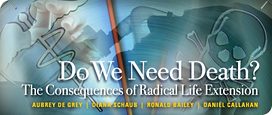Daniel Callahan thinks prolongevists are frustrating! Then he accuses pro-technology proponents of “scientism.” And finally he pulls out the argument of the desperate and compares his opponents to Hitler and Stalin! At that point one wants to quote the great philosopher (and comedian extraordinaire) Steve Martin: “Puh-leese!” Since I am traveling and without internet connection except via Blackberry I will be brief. My vision of a future in which effective longevity treatments are available is one in which individuals get to choose to use them or not–no government gets to decide how long its citizens will be allowed to live. That would truly be tyranny. In the meantime, if Callahan chooses to go “gentle into that good night” I wish him well of it, but his job is to warn us the dangers he sees arising from radically extended lives and that’s all very well. He should allow the rest of us to ignore his advice and find out for ourselves whether he is right or wrong. Let us learn freely from trial and error as people always have done.
The Mary Shelleys of Fearmongering
Also from this issue
Lead Essay
In this month’s provocative lead essay, Aubrey de Grey, the Chairman and Chief Science Officer of the Methuselah Foundation and a leading proponent of radical life extension, examines the arguments and rhetorical stategies of those who oppose the effort to defeat death. Setting his sights on the “pro-aging trance,” the “Tithonus error,” “biomedical wishful thinking,” and two ways the “geronto-apologists” evade the real question, de Grey argues that reconciliation to death is a kind of discrimination, but that “old people are people too, so aging must be seen for what it is: a scourge that deprives far more people of far more healthy years than any other.”
Response Essays
In her reply to de Grey’s lead essay, Diana Schaub, a professor of political science at Loyola College in Maryland and member of the President’s Council on Bioethics, emphasizes our duty to think through all the consequences of much-longer lifespans. Can monogamy survive 1000-year lives? “What would the tally of disappointments, betrayals, and losses be over a millennium?” Schaub asks. If some societies now must wait for tyrants to die, won’t they have to wait a long time in an ageless world? And tyranny aside, “a nation of ageless individuals could well produce a sclerotic society, petrified in its ways and views,” Schaub submits.
Ronald Bailey, Reason magazine’s science correspondent and author of Liberation Biology: The Moral and Scientific Case for the Biotech Revolution offers a vigorous and straightforward answer to this month’s question: “Do we need death? No. Next question.” But before turning to the next question, Bailey tackles some of the worries Diana Schaub raised in her reply to de Grey, and even addresses “pro-mortalist” arguments Daniel Callhan, our next commentator, has made elsewhere. “The highest expression of human nature and dignity,” Bailey claims, “is to strive to overcome the limitations imposed on us by our genes, our evolution, and our environment.”
Daniel Callahan, co-founder of the bioethics think tank the Hastings Center, digs beneath Aubrey de Grey’s premises and fundamentally challenges the idea that radical life extension would be a good thing. The argument against aging and death, Callahan argues, is “utopian” and depends on speculative “fairy tales” about the nature of very long lives. In a world of radical life extension, we might find people are “forced to continue working unless society and their children were prepared to support them for hundreds of years.” And social mobility may be imperiled if the old do not make way for the young. “Nature knew what it was doing when it arranged, through natural selection, to have all of us get old and die,” Callahan maintains.

